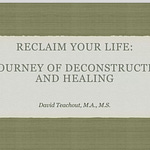Humanity’s Values is a reader-supported publication. Please consider subscribing as a way of supporting the delivery of the content you’re appreciating. Also, feel free to share and expand the community of reflective critcism.
We often create stories to address one problem, only to have it take on a life of its own. More difficult is when such a story is religion and the tendency towards absolutism, is a strong psychological pull. Jung’s “The Undiscovered Self” helps us see where when dealing with fanaticism we may unwittingly pull similar tendencies from within ourselves.
There is a tendency towards absolutism or fundamentalism, we all have. When ideology moves from “how you personally want to treat and be treated by others,” to “by the power of the State I will force you to do what I want” then there is a movement from personal freedom of conscience to a condemnation of anything deemed “other.”
The power of this tendency is so strong precisely because it is an emerging phenomenon from our basic desire to feel right about our vision of the world. To ask questions and be comforted by the uncomfortable process of radical inquiry is a daily practice for avoiding that spiral.
Moving away from Fanaticism
For principles to operate under when faced with the inevitable struggle for maintaining freedom of thought and speech in the face of fear and the demand for safety, this list from: "A Liberal Decalogue: Bertrand Russell’s Ten Commandments of Critical Thinking and Democratic Decency", published by Brain Pickings.
Perhaps the essence of the Liberal outlook could be summed up in a new decalogue, not intended to replace the old one but only to supplement it. The Ten Commandments that, as a teacher, I should wish to promulgate, might be set forth as follows:
Do not feel absolutely certain of anything.
Do not think it worth while to proceed by concealing evidence, for the evidence is sure to come to light.
Never try to discourage thinking for you are sure to succeed.
When you meet with opposition, even if it should be from your husband or your children, endeavor to overcome it by argument and not by authority, for a victory dependent upon authority is unreal and illusory.
Have no respect for the authority of others, for there are always contrary authorities to be found.
Do not use power to suppress opinions you think pernicious, for if you do the opinions will suppress you.
Do not fear to be eccentric in opinion, for every opinion now accepted was once eccentric.
Find more pleasure in intelligent dissent than in passive agreement, for, if you value intelligence as you should, the former implies a deeper agreement than the latter.
Be scrupulously truthful, even if the truth is inconvenient, for it is more inconvenient when you try to conceal it.
Do not feel envious of the happiness of those who live in a fool’s paradise, for only a fool will think that it is happiness.














Share this post